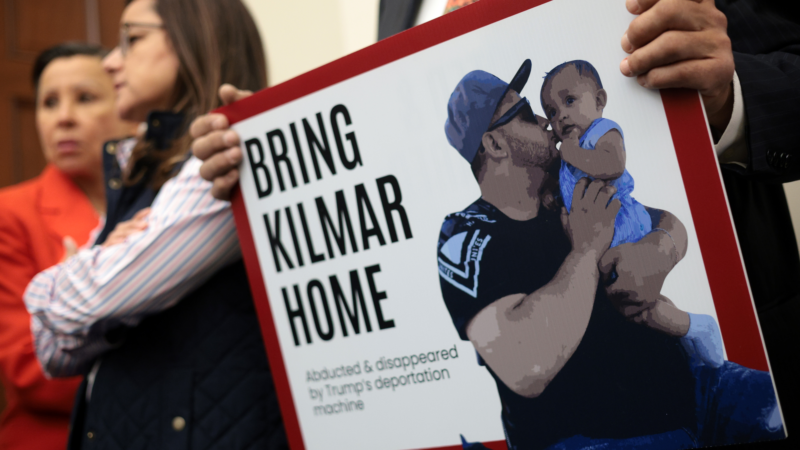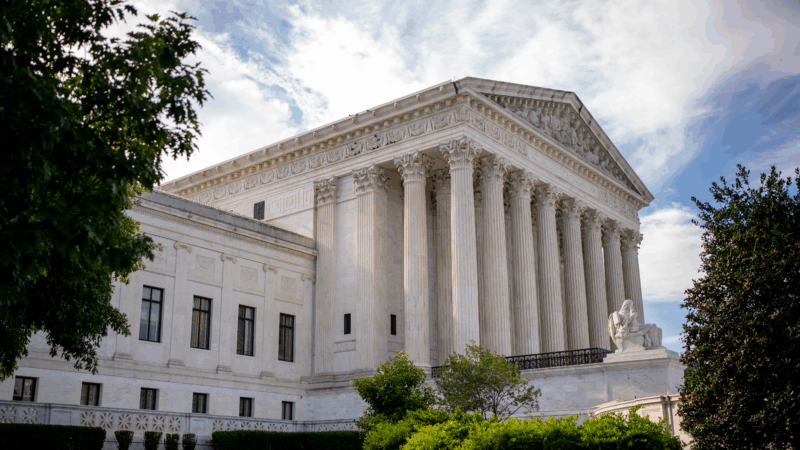Maryland judge again asks government to return man wrongly deported to El Salvador
GREENBELT, Md. — A federal judge in Maryland wants the federal government to do all it can to “facilitate” the return of a Maryland man mistakenly deported to El Salvador.
Just hours after the Supreme Court largely upheld her original order to bring Kilmar Abrego Gracia back to the U.S., federal judge Paula Xinis issued a new one, directing the federal government to “take all available steps to facilitate the return” of Abrego Garcia to the United States as soon as possible. And she ordered the Justice Department to provide an immediate update on his location and status, what steps the government has taken so far to bring him back and what additional steps it is considering.
In response, the Trump administration is asking for more time to answer the judge’s questions. In one court filing on Friday, lawyers for the Justice Department argued the government needs “a meaningful opportunity to review the Supreme Court’s decision before it is ordered to report what steps it will take in response to that decision.”
“Foreign affairs cannot operate on judicial timelines, in part because it involves sensitive country-specific considerations wholly inappropriate for judicial review,” the lawyers wrote in another filing.
Judge Xinis had rejected the Justice Department’s request to delay a status conference that was set for Friday afternoon.
Abrego Garcia’s case has become a high-stakes clash between the White House and courts, and the latest case to test how quickly the Trump administration can remove people it says are threats to Americans’ safety. His case is unique in that the administration admitted his deportation was a mistake, but says he cannot be brought back.
The Supreme Court on Thursday directed the Trump administration to “facilitate” Abrego Garcia’s release from custody in El Salvador, and to “be prepared to share what it can concerning the steps it has taken and the prospect of further steps.” The unsigned order marked a rare win for those challenging the administration’s deportation orders.
There were no dissents, though Justice Sonia Sotomayor in a statement accompanying the order wrote that “to this day, the Government has cited no basis in law for Abrego Garcia’s warrantless arrest, his removal to El Salvador, or his confinement in a Salvadoran prison. “Nor could it.” The court’s two other liberal justices joined her.
The Supreme Court sent the case back to Xinis with instructions to clarify the wording of her original order — in particular, her use of the word “effectuated” in her directions to the Trump administration.
Xinis’s order — now relying only on the word “facilitate” — seems intended to address the Supreme Court’s question.
The justices also wrote that the intended scope of that term is “unclear,” and that it might exceed the lower court’s authority. They instructed the lower court to “clarify its directive, with due regard for the deference owed to the Executive Branch in the conduct of foreign affairs.”
The Department of Homeland Security emphasized that section of the order in its response.
“SCOTUS agreed with us that the District Court improperly interfered with the President’s foreign affairs power,” said Tricia McLaughlin, assistant secretary for public affairs, in an emailed statement. “The District Court was overbearing and, as SCOTUS said, should clarify its directive with due regard for the deference owed to the Executive Branch in the conduct of foreign affairs. We look forward to continuing to advance our position in this case.”
Dispute over whether to bring him back
The Trump administration has admitted that Abrego Garcia was deported because of what it calls an “administrative error,” but has argued that there is nothing it can do because Abrego Garcia was already out of the U.S. in the custody of the Salvadoran government when the mistake was discovered.
Xinis, the Maryland judge, had earlier rejected that argument.
Abrego Garcia had been living in Maryland for over a decade, along with his wife and their three children, all U.S. citizens. In 2019, an immigration judge had granted him a form of protected status that should have prevented his deportation to El Salvador.
Despite that, ICE officers arrested Abrego Garcia last month. He was deported to El Salvador a few days later, along with hundreds of other men that the Trump administration accuses of being gang members.
The White House maintains that Abrego Garcia is a member of the Salvadoran gang, MS-13, which the Trump administration has designated as a Foreign Terrorist Organization, and should not be allowed back into the U.S.
But Abrego Garcia’s lawyers dispute that. They say he has been living peacefully in Maryland for 14 years, and has never been charged with or convicted of a crime in any country. Abrego Garcia’s lawyers argue the MS-13 allegations are based largely on an accusation from a confidential informant who accused him of being a member of the gang in New York, where Abrego Garcia has never lived.
Xinis described the accusations as “vague” and “uncorroborated,” and noted that the Trump administration has introduced no evidence of a criminal indictment or complaint into the record.
More appeals in the case are likely.
Still, the Trump administration appeared unwilling to back down. In a social media post on Thursday night, White House deputy chief of staff Stephen Miller framed the Supreme Court’s order as a rejection of the lower court’s reasoning.
The justices “made clear that a district court judge cannot exercise Article II foreign affairs powers,” Miller wrote. He argued that El Salvador is holding “the illegal alien terrorist” in custody, not the U.S. government — leaving it unclear exactly when, or if, Abrego Garcia would be returning to Maryland.
‘My role was making movies that mattered,’ says Jodie Foster, as ‘Taxi Driver’ turns 50
Foster was just 12 years old when she starred in the 1976 film. "What luck to have been part of that, our golden age of cinema in the '70s," she says. Her latest film is Vie Privée (A Private Life).
Supreme Court appears likely to uphold state bans on transgender athletes
To date, 27 states have enacted laws barring transgender participation in sports.
Keep an eye out for these new books from big names in January
The new year begins with a host of promising titles from George Saunders, Julian Barnes, Jennette McCurdy, Karl Ove Knausgaard and more. Here's a look ahead at what's publishing this month.
Want to play a Tiny Desk concert? The 2026 Contest is now open for entries
The 2026 Tiny Desk Contest, our annual search for the next great undiscovered artist, is now officially open for entries.
Scott Adams, the controversial cartoonist behind ‘Dilbert,’ dies at 68
Adams announced in May that he was dying of metastatic prostate cancer. Thousands of newspapers carried his strip satirizing office culture from the '90s until a controversy in 2023.
As Iran’s protests continue, Israelis and Palestinians watch closely
There is broad support for the protests among Israeli officials, but Palestinians say they hope the Iranian regime stays in place and the protests die down soon.








